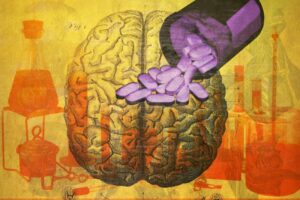
What is Opioid Use Disorder?
Opioid use disorder is a long-lasting (chronic) disease that can cause major health, social, and economic problems. Opioids are a class of drugs that act in the nervous system to produce feelings of pleasure and pain relief. Some opioids are legally prescribed by healthcare providers to manage severe and chronic pain. Commonly prescribed opioids include oxycodone, fentanyl, buprenorphine, methadone, oxymorphone, hydrocodone, codeine, and morphine. Some other opioids, such as heroin, are illegal drugs of abuse.
Opioid use disorder is characterized by a powerful, compulsive urge to use opioid drugs, even when they are no longer required medically. Opioids have a high potential for causing dependence in some people, even when the medications are prescribed appropriately and taken as directed. Many prescription opioids are misused or diverted to others. Individuals who become addicted may prioritize getting and using these drugs over other activities in their lives, often negatively impacting their professional and personal relationships. It is unknown why some people are more likely to develop a substance use disorder than others.
Opioids change the chemistry of the brain and lead to drug tolerance, which means that over time the dose needs to be increased to achieve the same effect. Taking opioids over a long period of time produces dependence, such that when people stop taking the drug, they have physical and psychological symptoms of withdrawal (such as muscle cramping, diarrhea, and anxiety). Dependence is not the same thing as a substance use disorder; although everyone who takes opioids for an extended period will become dependent, only a small percentage will experience the compulsive, continuing need for the drug that characterizes opioid use disorder.
Opioid use disorder can cause life-threatening health problems, including the risk of overdose. Overdose occurs when high doses of opioids cause breathing to slow or stop, leading to unconsciousness and death if the overdose is not treated immediately. Both legal and illegal opioids carry a risk of overdose if a person takes too much of the drug, or if opioids are combined with other drugs (particularly tranquilizers called benzodiazepines).
Opioid use disorder is a complex health condition that often requires long-term treatment and care. The treatment of opioid use disorder, is important to reduce its health and social consequences and to improve the well-being and social functioning of people affected. The main objectives of treating and rehabilitating persons with opioid use disorder are to reduce dependence on illicit drugs; to reduce the morbidity and mortality caused by the use of illicit opioids, or associated with their use, such as infectious diseases; to improve physical and psychological health; to reduce criminal behavior; to facilitate reintegration into the workforce and education system and to improve social functioning. The ultimate achievement of a drug free state is the ideal and ultimate objective but this is unfortunately not feasible for all individuals with opioid use disorder, especially in the short term.
As no single treatment is effective for all individuals with opioid use disorder, diverse treatment options are needed, including psychosocial approaches and pharmacological treatment.
Relapse following detoxification alone is extremely common, and therefore detoxification rarely constitutes an adequate treatment of substance use disorder, on its own. However, it is a first step for many forms of longer-term abstinence-based treatment. Both detoxification with subsequent abstinence-oriented treatment and substitution maintenance treatment are essential components of an effective treatment system for people with opioid use disorder.
GET HELP NOW!
